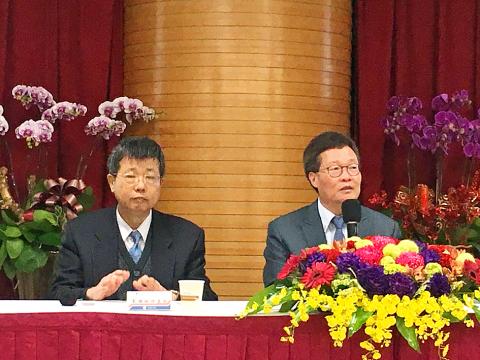CPC Corp, Taiwan (CPC, 台灣中油) yesterday said it plans to allocate more than NT$200 billion (US$6.44 billion) for capital expenditure over the next six years to expand its natural gas business.
“The capital spending would mainly be used for establishing the company’s third liquefied natural gas terminal and constructing natural gas infrastructure in the nation,” CPC chairman Derek Chen (陳金德) told a news conference in Taipei.
The state-run oil refiner plans to spend NT$60.8 billion on a new terminal in Taoyuan for storing natural gas, which is scheduled to start operations before 2023 with an estimated annual capacity of 3 million tonnes.

Photo: Huang Pei-chun, Taipei Times
“The [terminal] plan follows the government’s long-term goal of a nuclear-free homeland, and we expect the terminal to meet demand for natural gas in northern Taiwan,” Chen said.
The plan would require the approval of the Ministry of Economic Affairs and the Executive Yuan, company officials said.
On Thursday last week, Taiwan Power Co (Taipower, 台電), the nation’s main utility, said it was working on a project to build natural gas storage facilities at two coal-fired power plants in Taichung and Keelung, which are expected to be completed by 2025 when the Democratic Progressive Party (DPP) government’s nuclear-free homeland policy is scheduled to take effect.
In an effort to ensure a stable supply of energy, CPC is also planning to improve its infrastructure, including enlarging its natural gas plant in Taichung and building several onshore natural gas pipelines nearby, Chen said.
“The new infrastructure in Taichung is expected to lend support to the Tongxiao natural gas power plant in Miaoli County, which is operated by Taipower,” Chen said.
CPC will also allocate NT$38.4 billion for the renewal of facilities at its Taoyuan refinery to help produce higher=-quality products and reduce air pollution.
However, the renewal plan has been suspended since 2006, as area residents are concerned about potential pollution and want CPC to relocate the refinery, a CPC official said.
The official, who declined to be named, said that the company hopes to obtain the development permit by the end of this year, without giving a detailed timetable.
CPC yesterday also announced land reclamation plans for a new storage center at Kaohsiung Port (高雄港), which would cost nearly NT$53.6 billion.
It said it plans to integrate more than 300 existing storage tanks and pipelines in the new center to improve transportation efficiency.
The storage center is scheduled to start operations before 2024, it said.
The company is also looking for a partner for a joint venture to manufacture styrene and isononyl alcohol, in response to the government’s push for a circular economy, CPC said.

PATENTS: MediaTek Inc said it would not comment on ongoing legal cases, but does not expect the legal action by Huawei to affect its business operations Smartphone integrated chips designer MediaTek Inc (聯發科) on Friday said that a lawsuit filed by Chinese smartphone brand Huawei Technologies Co (華為) over alleged patent infringements would have little impact on its operations. In an announcement posted on the Taiwan Stock Exchange, MediaTek said that it would not comment on an ongoing legal case. However, the company said that Huawei’s legal action would have little impact on its operations. MediaTek’s statement came after China-based PRIP Research said on Thursday that Huawei filed a lawsuit with a Chinese district court claiming that MediaTek infringed on its patents. The infringement mentioned in the lawsuit likely involved

Taipei is today suspending work, classes and its US$2.4 trillion stock market as Typhoon Gaemi approaches Taiwan with strong winds and heavy rain. The nation is not conducting securities, currency or fixed income trading, statements from its stock and currency exchanges said. Authorities had yesterday issued a warning that the storm could affect people on land and canceled some ship crossings and domestic flights. Taiwan Semiconductor Manufacturing Co (TSMC, 台積電) expects its local chipmaking fabs to maintain normal production, the company said in an e-mailed statement. The main chipmaker for Apple Inc and Nvidia Corp said it has activated routine typhoon alert

GROWTH: TSMC increased its projected revenue growth for this year to more than 25 percent, citing stronger-than-expected demand for AI devices and smartphones The Taiwan Institute of Economic Research (TIER, 台灣經濟研究院) yesterday raised its forecast for Taiwan’s GDP growth this year from 3.29 percent to 3.85 percent, as exports and private investment recovered faster than it predicted three months ago. The Taipei-based think tank also expects that Taiwan would see a 8.19 percent increase in exports this year, better than the 7.55 percent it projected in April, as US technology giants spent more money on artificial intelligence (AI) infrastructure and development. “There will be more AI servers going forward, but it remains to be seen if the momentum would extend to personal computers, smartphones and

Catastrophic computer outages caused by a software update from one company have once again exposed the dangers of global technological dependence on a handful of players, experts said on Friday. A flawed update sent out by the little-known security firm CrowdStrike Holdings Inc brought airlines, TV stations and myriad other aspects of daily life to a standstill. The outages affected companies or individuals that use CrowdStrike on the Microsoft Inc’s Windows platform. When they applied the update, the incompatible software crashed computers into a frozen state known as the “blue screen of death.” “Today CrowdStrike has become a household name, but not in